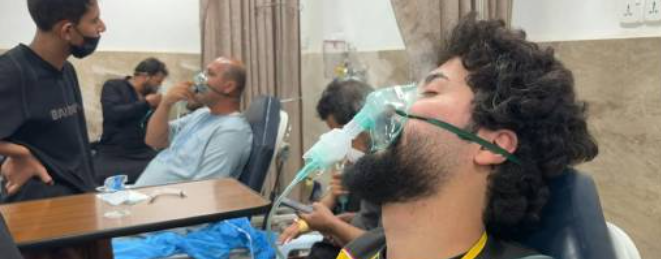A chlorine gas leak from a water treatment station on the road connecting the Iraqi Shiite holy cities of Najaf and Karbala led to the brief hospitalization of over 600 pilgrims suffering from respiratory issues. The incident occurred during the annual Arbaeen pilgrimage, a 40-day period of mourning observed by Shiite Muslims to commemorate the death of Imam Hussein, the grandson of the Prophet Mohammed. Millions of pilgrims are expected to journey to Karbala, home to the shrines of Imam Hussein and his brother Abbas, to participate in the Arbaeen rituals. While all affected pilgrims received prompt medical attention and were subsequently discharged in good health, the incident underscores the vulnerabilities of Iraq’s infrastructure and the potential risks faced by large gatherings of people.
The Iraqi health ministry confirmed the incident, reporting 621 cases of asphyxiation resulting from the chlorine gas leak. Security forces responsible for pilgrim safety attributed the leak to a malfunction at a water station situated along the Najaf-Karbala road, a vital artery for the massive influx of pilgrims during the Arbaeen period. The swift response of medical personnel averted a potentially more serious health crisis, with all affected individuals receiving necessary treatment and being released from hospitals.
The chlorine gas leak highlights the precarious state of Iraq’s infrastructure, a legacy of decades of conflict and widespread corruption. Essential services, including water treatment facilities, often suffer from neglect and inadequate maintenance, increasing the likelihood of accidents and posing significant risks to public health. The lack of stringent safety protocols and oversight further exacerbates these vulnerabilities, leaving communities susceptible to preventable incidents.
This incident is not an isolated case of infrastructure failure leading to tragic consequences in Iraq. In July, a devastating fire engulfed a shopping mall in the eastern city of Kut, claiming the lives of over 60 people, many of whom perished from suffocation while seeking refuge in restrooms. The Kut fire, like the Karbala chlorine leak, serves as a grim reminder of the urgent need for improvements in infrastructure safety and emergency preparedness across the country.
The Arbaeen pilgrimage, one of the largest religious gatherings globally, attracts millions of pilgrims from around the world, putting immense strain on local resources and infrastructure. Ensuring the safety and well-being of these pilgrims is a paramount concern for Iraqi authorities. The chlorine gas leak incident underscores the importance of implementing robust safety measures and preventative protocols to mitigate potential risks during mass gatherings. This includes meticulous inspections of critical infrastructure, such as water treatment plants, to prevent malfunctions and ensure the safety of both pilgrims and local residents.
Addressing Iraq’s infrastructure challenges requires a multi-pronged approach encompassing investments in modernization and maintenance, enhanced safety regulations, and rigorous enforcement of existing standards. The government must prioritize the allocation of resources to upgrade critical infrastructure and implement robust safety protocols to prevent future tragedies. International cooperation and technical assistance can also play a crucial role in supporting Iraq’s efforts to improve infrastructure resilience and ensure public safety. Furthermore, promoting transparency and accountability in infrastructure projects is essential to combat corruption and ensure that resources are utilized effectively. Ultimately, a comprehensive and sustained commitment to infrastructure development and safety is vital for safeguarding the lives and well-being of the Iraqi people and preventing future disasters.


